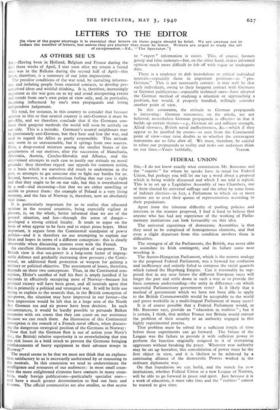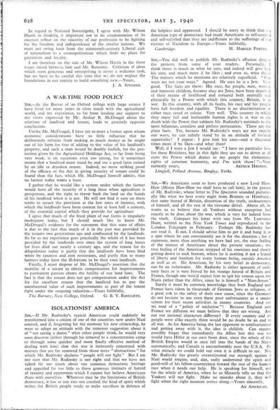FEDERAL UNION
do not know exactly what constitution Mr. Ransome and the " experts " for whom he speaks have in mind for Federal Union, but perhaps you will let me say a word about a proposal which is being widely discussed and which I am told is typical. This is to set up a Legislative Assembly of two Chambers, one of them elected by universal suffrage and the other by some form of indirect election—in fact, a Parliament to which six or more nations are to send their quotas of representatives according to their populations.
Apart from the inherent difficulty of pooling policies and interests in the manner proposed, I find it hard to believe that anyone who has had any experience of the working of Parlia- mentary institutions can look favourably on this idea.
The universal experience of democratic Assemblies is that they need to be compbsed of homogeneous elements, and that even a slight departure from this condition involves them in difficulties.
The strongest of all the Parliaments, the British, was never able to assimilate its Irish contingent, and its failure came near wrecking it.
The Austro-Hungarian Parliament, which is the nearest analogy to the proposed Federal Parliament, was a byword for confusion and inefficiency and entirely failed to compose the racial quarrels which ruined the Hapsburg Empire. Can it reasonably be sup- posed that in any near future the different European races will forget the past and settle down in such a way as to provide the basic common understanding—the unity in difference—on which successful Parliamentary government rests? Is it likely that a method of government which we have not been able to apply to the British Commonwealth would be acceptable to the world and prove workable in a multi-lingual Parliament of many races?
It is of course possible that a Federal Parliament would, as Mr. Ransome says, provide an "education in realities " ; but it is certain, I think, that neither France nor Britain would entrust the problem of their security to an authority engaged in this highly experimental process.
That problem must be solved for a sufficient length of time before these experiments can go forward. The failure of the League was the failure to provide it with sufficient power to perform the function originally assigned to it of restraining aggressors without breaking the peace. Whatever new authority may be set up hereafter, this consolidation of power must be the first object in view, and it is likeliest to be achieved by a continuing alliance of the democratic Powers worked in the ordinary diplomatic way.
On that foundation we can build, and the search for new institutions, whether Federal Union or a new League of Nations, will be able to go forward in peace and quiet. just because it is a work of education, it must take time and the " realities " cannot be trusted to give time. In regard to National Sovereignty, I agree with Mr. Wilson Harris in thinking it important not to let condemnation of its excesses reflect on the sincerity of our profession to be fighting for the freedom and independence of the smaller nations. We must not swing back from the nineteenth-century Liberal cult of nationalism to a cosmopolitanism which finds no place for patriotism and loyalty.
I am therefore on the side of Mr. Wilson Harris in the three issues raised between him and Mr. Ransome. Criticism of ideas which seem generous and enterprising is never a welcome task, but we have to be careful this time that we do not neglect the foundations in our anxiety to build something new.—Yours, J. A. SPENDER.



































 Previous page
Previous page